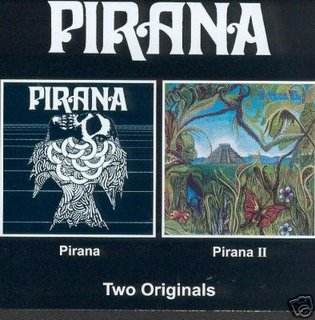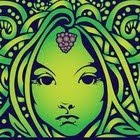 Was it observers at the time, many of whom pigeonholed Pirana as mere Santana clones, or was it the band that did itself a disservice? Its dynamic and rhythmic performance at the definitive Sunbury music festival in 1972 drew close comparisons to the latin-rock champions of Woodstock, the band even encoring at Sunbury with a rippling version of Soul Sacrifice. Yet, to this writer's ears at least, there was so much more to Pirana than that facile dismissal allows, notwithstanding their similarly-styled moniker.
Was it observers at the time, many of whom pigeonholed Pirana as mere Santana clones, or was it the band that did itself a disservice? Its dynamic and rhythmic performance at the definitive Sunbury music festival in 1972 drew close comparisons to the latin-rock champions of Woodstock, the band even encoring at Sunbury with a rippling version of Soul Sacrifice. Yet, to this writer's ears at least, there was so much more to Pirana than that facile dismissal allows, notwithstanding their similarly-styled moniker.Let's acknowledge, then set aside for a moment, the band's obvious debt to Santana as their early musical template. Beyond that, we can hear examples of fine, melodic songwriting - mainly from keyboardist Stan White on the first album, but consummately taken over by guitarist and vocalist Tony Hamilton on the second - that displays a diversity of influences while still keeping the band's innate individuality. It's a bit like their contemporary peers, Sebastian Hardie or Sherbet, who also had a hard time living down copious (and mostly bogus) comparisons while they tried to forge an original path.
For a start, Tony Hamilton's guitar was never less than wonderfully apeshit and awesome. He sang with soul, commandingly atop Jim Yonge's supreme and complex drum feels, all the time supported by the anchorage of Graeme Thompson's throbbing bass. Keyboards were also important to the Pirana sound, and Stan White and his successor, Keith Greig, provided rich Hammond organ reinforcement for the overall feel of the band.
In Pirana, members came and went, but it is essentially the core band comprising Duke-Yonge, Thompson, Hamilton and Greig (who replaced Stan White after the first LP), who made the records and sustained the bulk of the band's performing tenure, and must be most remembered as the definitive entity. Hamilton, Thompson and Yonge were all ex-members of Gus & The Nomads, a 60s R&B/pop band fronted by "the wild man of Sydney rock" Gus McNeil. Gus was executive producer on Pirana's debut LP and several other the legendary A Product Of A Broken Reality for Company Caine, produced Greg Quill's early solo recordings including the LP Fleetwood Plain, and set up his own publishing company Cellar, which besides Pirana, also handled publishing for Mike Rudd, Greg Quill, Ross Wilson and Gulliver Smith.
Pirana first recorded as the backing group for the 1970 solo album Fleetwood Plain by Sydney singer-songwriter Greg Quill. They signed to Harvest in 1971 and issued two singles. Here It Comes Again (May) was reputedly the first local single released in stereo, and can still be found on Raven's Golden Miles compilation CD; the same month they toured nationally as support band on the historic package tour by Deep Purple, Free and Manfred Mann's Chapter Three. Their second single was I Hope You Don't Mind (Nov.) Late in the year Stan White left to join pop band The Going Thing, and he was replaced by Keith Greig.
In concert they were always regarded as a top-drawer act; they went down a storm at the inaugural Sunbury rock festival, and their live version of Santana's Soul Sacrifice appeared on the Sunbury album. EMI issued their second LP Pirana II in November 1972, by which time Richard McEwan had replaced Hamilton on guitar. Andrew James replaced Greig in 1973 and Phil Hitchcock replaced Graeme Thompson on bass in 1974. The band continued to work on the dance and pub circuit, but they didn't record again, and they eventually broke up in late 1974. Duke-Yonge (aka Jimmy Tonge) went on to work with Corroborree, the Anne Kirkpatrick Band and Bullamakanka. Milesago
Australian psych/prog band's second album originally released on Harvest Records in 1972. With it's unforgettable artwork, this album featured some exceptionally strong Aussie prog rock, blending as it did some fine instrumentals, lots of fuzz guitars and flowing Hammond organ. pirana were always regarded as one of the top Australian live acts of the time, but the 9 tracks of this indisputably strong album prove that the band was equally at home in the studio. Freak Emporium
Link




















































3 comments:
How on earth did you find these lol?? I grew up with Pirana posters slapped all over the city but was just a little too young to see them perform (I'm from Melbourne). I heard them on the radio though and this will be a great bit of nostalgia.
Here,s another early Aussie band
grabbed from PapaStalin,s site
hope you like it
Blackfeather(1971) - At The Mountains Of Madness
mp3 - 128kbs
pass = PapaStalin
http://rapidshare.de/files/14168285/PapaStalin_-_Blackfeather1.zip.html
http://rapidshare.de/files/14169375/PapaStalin_-_Blackfeather2.zip.html
I used to watch them perform at the Hawaiain Eye disco in Sydney and earlier when they were known as The Nomads. I still have their first album Pirana on vinyl, but I never knew they had released a second album. They were a great band.
Peter O.
Post a Comment